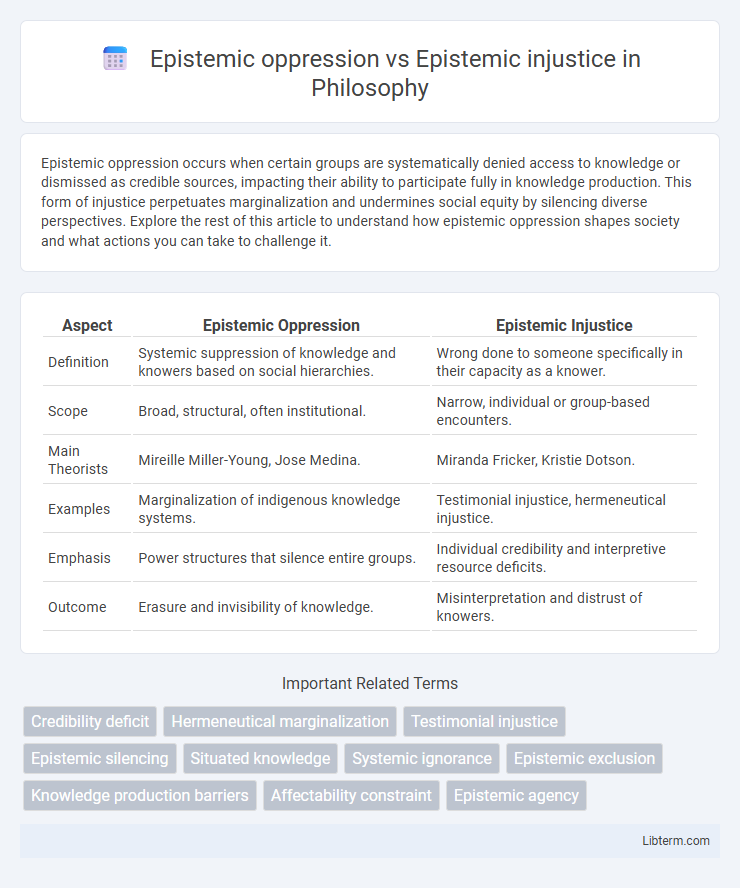Epistemic oppression occurs when certain groups are systematically denied access to knowledge or dismissed as credible sources, impacting their ability to participate fully in knowledge production. This form of injustice perpetuates marginalization and undermines social equity by silencing diverse perspectives. Explore the rest of this article to understand how epistemic oppression shapes society and what actions you can take to challenge it.
Table of Comparison
| Aspect | Epistemic Oppression | Epistemic Injustice |
|---|---|---|
| Definition | Systemic suppression of knowledge and knowers based on social hierarchies. | Wrong done to someone specifically in their capacity as a knower. |
| Scope | Broad, structural, often institutional. | Narrow, individual or group-based encounters. |
| Main Theorists | Mireille Miller-Young, Jose Medina. | Miranda Fricker, Kristie Dotson. |
| Examples | Marginalization of indigenous knowledge systems. | Testimonial injustice, hermeneutical injustice. |
| Emphasis | Power structures that silence entire groups. | Individual credibility and interpretive resource deficits. |
| Outcome | Erasure and invisibility of knowledge. | Misinterpretation and distrust of knowers. |
Defining Epistemic Oppression
Epistemic oppression refers to systemic processes that marginalize certain groups by restricting their access to knowledge production and validation. Unlike epistemic injustice, which involves specific instances of unfair treatment related to knowledge, epistemic oppression encompasses broader, structural mechanisms that consistently silence or devalue the epistemic contributions of marginalized communities. Central to epistemic oppression is the denial of epistemic agency and exclusion from dominant knowledge frameworks, reinforcing social hierarchies and perpetuating inequality.
Understanding Epistemic Injustice
Epistemic injustice involves unfair treatment of individuals as knowers, often manifesting as testimonial injustice or hermeneutical injustice, where certain voices are marginalized or discredited. Epistemic oppression extends this concept by situating these injustices within systemic power structures that perpetuate knowledge exclusion and silencing of marginalized groups. Understanding epistemic injustice requires examining how social power dynamics distort knowledge production and distribution, impacting the credibility and interpretive resources available to oppressed communities.
Key Theoretical Foundations
Epistemic oppression refers to systemic and structural barriers that limit marginalized groups' access to knowledge production, while epistemic injustice involves specific wrongs inflicted on individuals in their capacity as knowers, as conceptualized by Miranda Fricker. Key theoretical foundations of epistemic injustice include testimonial injustice, where prejudices lead to distrust of marginalized individuals' knowledge, and hermeneutical injustice, which highlights gaps in collective interpretive resources affecting marginalized groups' ability to understand and communicate their experiences. Epistemic oppression expands on these concepts by emphasizing broader power dynamics and institutionalized practices that perpetuate inequality in epistemic agency and representation.
Historical Contexts and Development
Epistemic oppression refers to systematic silencing or marginalization of certain groups' knowledge systems rooted in historical colonization, slavery, and institutional discrimination. Epistemic injustice, a concept developed by Miranda Fricker in the early 2000s, specifically examines wrongful treatment in knowledge contexts, such as testimonial injustice and hermeneutical injustice. The development of these concepts traces back to social justice movements and decolonial theories addressing power imbalances in knowledge production and validation.
Types of Epistemic Injustice
Epistemic injustice encompasses testimonial injustice, where a speaker's credibility is unfairly deflated due to prejudice, and hermeneutical injustice, which arises from structural gaps in collective interpretive resources that disadvantage marginalized groups. Epistemic oppression extends beyond individual incidents to systemic patterns that structurally inhibit certain groups from participating fully in knowledge production and dissemination. Understanding these types helps identify how social power dynamics shape whose knowledge is validated or suppressed.
Mechanisms of Epistemic Oppression
Epistemic oppression operates through systemic mechanisms that silence, marginalize, or discredit the knowledge produced by certain social groups, often based on race, gender, or class. These mechanisms include exclusion from knowledge production platforms, devaluation of experiential knowledge, and epistemic violence such as misrepresentation or stigmatization. Unlike epistemic injustice, which typically addresses specific instances of unfair knowledge treatment, epistemic oppression encompasses broader structural practices that maintain unequal power dynamics in epistemic authority.
Comparative Analysis: Similarities and Differences
Epistemic oppression and epistemic injustice both involve the wrongful treatment of individuals in knowledge-related contexts, but epistemic oppression refers to systemic and structural conditions that inhibit entire groups from producing, accessing, or sharing knowledge, while epistemic injustice primarily concerns interpersonal wrongs like testimonial and hermeneutical injustices that occur during knowledge exchange. Both concepts highlight power imbalances affecting epistemic agents, yet epistemic oppression encompasses broader social systems and institutional mechanisms, whereas epistemic injustice focuses on specific acts of epistemic harm or unfairness at the individual or community level. Understanding these distinctions clarifies how social inequalities manifest in epistemic environments and informs strategies for promoting epistemic equity and inclusion.
Impacts on Marginalized Communities
Epistemic oppression systematically denies marginalized communities access to knowledge production and validation, reinforcing social exclusion and limiting opportunities for empowerment. Epistemic injustice manifests through testimonial injustice, where individuals' credibility is unfairly deflated, and hermeneutical injustice, where gaps in collective interpretive resources hinder understanding of their experiences. Both concepts deeply impact marginalized groups by perpetuating inequality, restricting agency, and undermining social recognition and participation.
Strategies for Resistance and Change
Epistemic oppression involves systemic barriers that restrict marginalized groups' access to knowledge production and dissemination, while epistemic injustice refers to individual or group unfair treatment in knowledge practices, such as testimonial injustice or hermeneutical injustice. Strategies for resistance include amplifying marginalized voices through inclusive epistemic practices, fostering critical consciousness, and implementing institutional reforms that democratize knowledge authority. Promoting community-based knowledge systems and accountability mechanisms counters epistemic exclusion and facilitates epistemic justice.
Future Directions in Epistemic Studies
Future directions in epistemic studies emphasize distinguishing epistemic oppression from epistemic injustice by exploring systemic structures that perpetuate knowledge silencing beyond individual interactions. Research increasingly focuses on developing frameworks to address collective epistemic harms, incorporating intersectional perspectives and marginalized communities' voices. Emerging methodologies advocate for transformative practices that reconceptualize epistemic agency and power dynamics in knowledge production and dissemination.
Epistemic oppression Infographic

 libterm.com
libterm.com